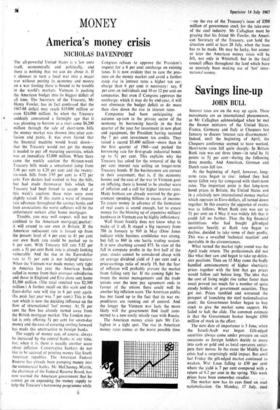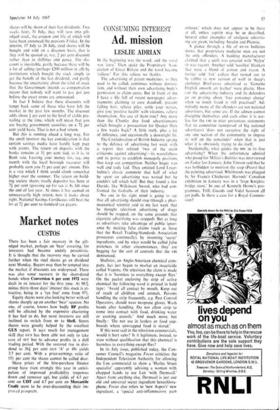Savings line-up
JOHN BULL
Interest rates are on the way up again. These movements are an international phenomenon, as Mr Callaghan acknowledged when he met the finance ministers of the United States, France, Germany and Italy at Chequers last January to discuss 'interest rate disarmament.'
Indeed, until the beginning of April, the Chequers conference seemed to have worked.
Short-term rates fell quite sharply. In Britain Bank rate was cut three times—in total by If points to 51 per cent—during the following three months. And American, German and Dutch rates fell too.
At the beginning of April, however, long- term rates began to rise: indeed they had never fallen very far compared with short-term rates. The important point is that long-term bond prices in Britain, the United States and in a relatively new international money market which operates in Euro-dollars, all turned down together. In this country the sequence of events
was as follows. When it was cut to
51- per cent on 4 May it was widely felt that it could fall no further. Thus the big financial institttions who had bought gilt-edged securities heavily as Bank rate began to decline, decided to take some of their profits. This was a so-called 'technical reaction' and inevitable in the circumstances.
What turned the market right round was the April trade return. The professionals did not like what they saw and began to take up defen- sive positions. Then on 15 May came the badly handled announcement of higher electricity prices together with the hint that gas prices would follow suit before long. The idea that the cost of living might rise rather faster than usual proved too much for a number of quite steady holders of government securities. They got out. Prices tumbled and worsened the prospect of launching the steel nationalisation stock; the Government broker began to buy stock to give the market some support. He failed to halt the slide. The common estimate is that the Government broker bought £500 million of stock in the effort.
The next date of importance is 5 June, when the Israeli-Arab war began. Gilt-edged securities always come under pressure on such
occasions as foreign holders decide to move into cash or gold and as local operators antici-.
pate their moves. In the event the Middle East crisis had a surprisingly mild impact. But until last Friday the gilt-edged market continued to weaken, War Loan falling to £50 per cent where the yield is 7 per cent compared with a return of 6.2 per cent in the spring. This week prices have been somewhat steadier.
The market now has its eyes fixed on steel nationalisation. On Monday, 17 July, steel
shares will be shorn of their last dividends. Two weeks later, 31 July, they will turn into gilt- edged stock, the coupon and life of which will have been anounced the previous Friday. In the interim, 17 July to 28 July, steel shares will be bought and sold on a discount basis, that is they will be quoted at, say, 2 per cent discount rather than in shillings and pence. The dis- count is inevitable, partly because there will be a lot of selling (perhaps £200 million in all) by institutions which bought the stock simply to get the benefit of the last dividend, and partly because the uncertainty about the kind of stock that the Government intends as compensation means that nobody will want to pay par just before the exact terms are announced.
In fact I believe that these discounts will tempt back some of those who have left the market in the past few months. The discount adds about I per cent to the level of yields pre- vailing at the time, which will mean that you are buying government securities on a 74- per cent yield basis. That is not a bad return.
But this is running ahead a long way. For the small investor the key consideration is that certain savings media have hardly kept pace with events. The return on deposits with the banks remains at 31 per cent tied, as it is, to Bank rate. Leaving your money for, say, one month with the local borough treasurer will probably earn you 5-t- per cent per annum. This is a rate which I think could climb somewhat higher over the summer. The return on build- ing society shares (really deposits) has been at 7+ per cent (grossing up for tax at 8s 3d) since the end of last year. At times it has seemed an unnecessarily high return, now it looks about right. National Savings Certificates still beat the lot at 71 per cent to standard tax payers.































 Previous page
Previous page